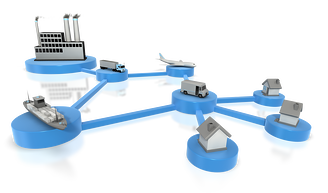How to Understand SAP Modules in 5 minutes
SAP ERP Mindmap

We frequently get a very interesting question from some of the most senior level executives in the Industry: What exactly is SAP? Sometimes they may even have SAP installed and not really know “what’s in the box”.
Whose fault is this? As Senior SAP Project Managers, we have to say it is our fault, the SAP consultants, for not simplifying and clarifying what SAP is. To make it simple, we have created a mind-map of the SAP system, which is based on the SAP architecture documentation, and a great deal of general system knowledge gained over the years. This is not a complete picture of the offering either, as we have left out the SAP partner offerings, which are another universe in and unto themselves.
Doing a quick walk-through, starting with finance and proceeding clockwise: The SAP Enterprise Resource Management (ERP) System consist of a series of fully integrated SAP modules, which, for example, immediately reflect the impact of a purchase order on a company’s financial status.
- Finance Module: Includes such modules as Financial Accounting, Controlling, Investment Management, Asset Management and Treasury Management
- Logistics Module: Includes Sales and Distribution, Materials Management, Warehouse Management, Product Lifecycle Management, Production Planning
- Human Capital Management: All modules required to define an organization, recruit, hire and manage human resources.
- Netweaver: The underlying technology platform that SAP operates on, as well as SAP Business Warehouse.
- Supply Chain Management (SCM): Originally understood to be SAP APO or Advanced Planner and Optimizer, now includes, via integration, many parts of the logistics system
- Customer Relationship Management (CRM): Includes modules for Sales, Service and Marketing and call center management, integrated with Sales and Distribution.
- Master Data Management: A suite of tools designed to manage the entire lifecycle of your Master Data (Customer Data, Product Data, many others)
- Strategic Enterprise Management: Though somewhat supplanted by Business Objects Business Planning and Consolidation (BPC), includes Business Planning and Simulation (BPS), Balanced Scorecard (Balanced Scorecard), Stakeholder Relationship Management (SRM), Management Cockpit and Business Consolidation (BCS)
- Business Warehouse (BW): Includes everything you need to build a datawarehouse, including ETL (Extract, Transform, Load, Staging Tools, Metadata Management, Modeling, and Query and Reporting Tools)
- Industry Solutions: More than 30 Industry specific solutions and numerous partner Industry Solutions, including MRO (Maintenance Repair and Overhaul), Flexible Real Estate (REFX), Well Drilling, Legal Services, Poultry and Dairy, among many.
As you can see, there is a lot to know to really understand all the different SAP modules available.
We also recommend reading:
How to Shape an IT Strategic Plan
Execute Your SAP Projects Better, Cheaper, Faster
SAP BW Tutorial Best Practice on Project Charter
SAP BusinessObjects BI 4 Advanced Analysis Demo
Understanding the most common SAP Data Warehousing Concepts
What are 2 Primary Focus Areas for SAP Airline Customers?
Top 10 Guidelines to Choosing a SAP Service Partner
How Is IT Consulting Distinct From SAP BW Consulting?
5 Surprising Reasons Enterprises Don’t Use An ERP
Top 10 Benefits for Financial Analysis in the Latest SAP EP4
Hire SAP Business Intelligence Consultant
SAP Industry Knowledge and Expertise

SAP Industry Solutions Span the Globe
 We have very deep industry expertise in:
We have very deep industry expertise in:
- Aerospace and Defense,
- Automotive Manufacturing
- Government
- Retail
- CPG
- Wholesale, Warehouse Distribution
- Railroads
- Well Drilling
- Engineering Construction & Operations
- Airline MRO





